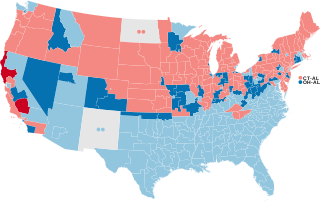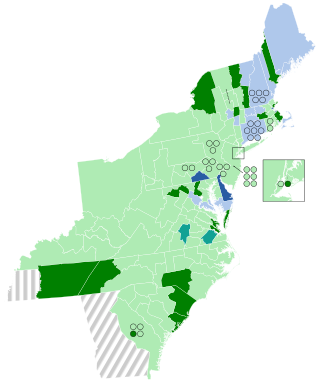
The 14th United States Congress was a meeting of the legislative branch of the United States federal government, consisting of the United States Senate and the United States House of Representatives. It met in the Old Brick Capitol in Washington, D.C. from March 4, 1815, to March 4, 1817, during the seventh and eighth years of James Madison's presidency. The apportionment of seats in the House of Representatives was based on the 1810 United States census. Both chambers had a Democratic-Republican majority.

The 1948 United States House of Representatives elections were elections for the United States House of Representatives to elect members to serve in the 81st United States Congress. They were held for the most part on November 2, 1948, while Maine held theirs on September 13. These elections coincided with President Harry S. Truman's election to a full term. Truman had campaigned against a "do-nothing"' Republican Party Congress that had opposed his initiatives and was seen as counterproductive. The Democratic Party regained control of both the House and Senate in this election. For Democrats, this was their largest gain since 1932. These were the last elections until 1980 when a member of a political party other than the Democrats, Republicans, or an independent had one or more seats in the chamber. As of 2023, this is the last time the Democrats gained more than 50 seats in a U.S. House election.
The 1816–17 United States House of Representatives elections were held on various dates in various states between April 30, 1816 and August 14, 1817. Each state set its own date for its elections to the House of Representatives before the first session of the 15th United States Congress convened on December 1, 1817. The size of the House increased to 184 after Indiana and Mississippi achieved statehood.
The 1814–15 United States House of Representatives elections were held on various dates in various states between April 26, 1814 and August 10, 1815. Each state set its own date for its elections to the House of Representatives before the first session of the 14th United States Congress convened on December 4, 1815. They occurred during President James Madison's second term. Elections were held for all 182 seats, representing 18 states.

The 1812–13 United States House of Representatives elections were held on various dates in various states between August 3, 1812, and April 30, 1813. Each state set its own date for its elections to the House of Representatives before the first session of the 13th United States Congress convened on May 24, 1813. They coincided with James Madison being re-elected president.

The 1804–05 United States House of Representatives elections were held on various dates in various states between April 24, 1804 and August 5, 1805. Each state set its own date for its elections to the House of Representatives before the first session of the 9th United States Congress convened on December 2, 1805. The elections occurred at the same time as President Thomas Jefferson's re-election. Elections were held for all 142 seats, representing 17 states.

The 1816–17 United States Senate elections were held on various dates in various states. As these U.S. Senate elections were prior to the ratification of the Seventeenth Amendment in 1913, senators were chosen by state legislatures. Senators were elected over a wide range of time throughout 1816 and 1817, and a seat may have been filled months late or remained vacant due to legislative deadlock. In these elections, terms were up for the senators in Class 2.

The 1814 United States House of Representatives elections in New York were held from April 26 to 28, 1814, to elect 27 U.S. Representatives to represent the State of New York in the United States House of Representatives of the 14th United States Congress.

The 1816 United States House of Representatives elections in New York were held from April 23 to 25, 1816, to elect 27 U.S. Representatives to represent the State of New York in the United States House of Representatives of the 15th United States Congress. At the same time, a vacancy was filled in the 14th United States Congress.

The 1818 United States House of Representatives elections in New York were held from April 28 to 30, 1818, to elect 27 U.S. Representatives to represent the State of New York in the United States House of Representatives of the 16th United States Congress.

The 1822 United States House of Representatives elections in New York were held from November 4 to 6, 1822, to elect 34 U.S. Representatives to represent the State of New York in the United States House of Representatives of the 18th United States Congress.

The 1816 special elections for Maryland's 5th congressional district were to fill two separate vacancies. The 5th district was a plural district, with two seats. Both seats were vacated, the first by Representative Nicholas R. Moore (DR) in 1815, before the 14th Congress even met, and the second by Rep. William Pinkney (DR) on April 18, 1816 after being named Minister to Russia.

A special election was held in Maryland's 3rd congressional district in 1816 to fill a vacancy left by the resignation of Alexander C. Hanson (F) upon being elected to the United States Senate.

On December 15, 1815, having been elected to the Senate, Nathaniel Macon (DR) of North Carolina's 6th district resigned. To fill the vacancy left in North Carolina's representation for the 14th Congress, a special election was held on January 22, 1816.

On April 16, 1816, Richard Stanford (DR) of North Carolina's 8th district died in office. A special election was held to fill the resulting vacancy

On September 16, 1816, Representative-elect Henry B. Lee (DR) of New York's 4th district died before the start of the 15th Congress, to which he'd been elected. A special election was held prior to the beginning of the first session of Congress to fill the resulting vacancy.
A special election was held in Massachusetts's 11th congressional district on August 26, 1816, to fill a vacancy left by the death of Elijah Brigham (F) on February 22, 1816.
A special election was held August 26, 1817 in Massachusetts's 1st congressional district to fill a vacancy left by the resignation of Representative-elect James Lloyd (F) before the beginning of the 15th Congress.

The 1816 United States elections elected the members of the 15th United States Congress. Mississippi and Illinois were admitted as states during the 15th Congress. The election took place during the First Party System. The Democratic-Republican Party controlled the presidency and both houses of Congress, while the Federalist Party provided only limited opposition. The election marked the start of the Era of Good Feelings, as the Federalist Party became nearly irrelevant in national politics after the War of 1812 and the Hartford Convention.









